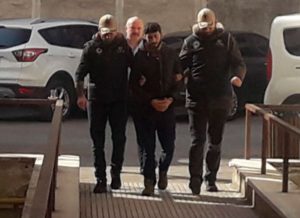Abdullah Bozkurt/Stockholm
A Syrian man who admitted to fighting for the Islamic State in Iraq and Syria (ISIS) and killing many people was sentenced to three years in prison despite the fact that the prosecutor demanded a life sentence in the indictment.
Ibrahem Tahen, a 30-year-old Syrian national, was detained on February 27, 2019 in Turkey’s northwestern province of Bursa as part of a police operation against ISIS cells. He was found in his hideout in a basement apartment located in downtown Yıldırım.
He was formally arrested on March 4 and put in pretrial detention. Tahen wanted to cut a deal with the public prosecutor who investigated his crimes and volunteered to share detailed information about ISIS and what he did for them.
Apparently not convinced by what he said during the deposition, the prosecutor demanded that the court convict him and sentence him to life.
A member of the al-Naim tribe, one of the largest in Syria, Tahen said he joined ISIS in the summer of 2014, received training in arms and traveled with two handguns and an AK-47 at all times. Some of his brothers and extended family members were also fighting for ISIS. His uncle Abdallah Tahen was a senior ISIS commander and in charge of the Badia region between Raqqah and Aleppo. He was killed in an airstrike in al-Bab.

Although he denied murdering civilians and said he refused to comply with ISIS orders to that effect, Tahen nevertheless admitted to killing Kurds affiliated with the Kurdistan Workers’ Party (PKK) and its Syrian off-shoots as well as soldiers of the Syrian regime, Iran and Russia. He had mainly been stationed in Deir ez-Zor and Hama and was on the ISIS payroll, receiving a monthly salary for himself and his family.
According to his statement ISIS did not get into any conflicts with Turkish troops deployed to guard the tomb of Süleyman Şah — the grandfather of Osman I, founder of the Ottoman Empire – which was located in Syrian territory some 30 kilometers from the Turkish border. “We were 150 meters away from the tomb,” Tahen said.
At the time ISIS militants were using a route close to the tomb to get to the Turkish border to engage in fights with Kurdish militants.
To force Turkey into a bargain, ISIS militants had surrounded the tomb since March 2014, preventing the delivery of food and water. Turkish soldiers were trapped near the tomb, and a change of guard that usually takes place every two or three months did not occur.
Preceding the ISIS siege, the Turkish military had repeatedly asked the government to move the tomb to a secure location, but the requests were denied. By the time ISIS took over the territory around the tomb, reportedly part of another deal struck by the Turkish government with ISIS, it was too late.

The government of President Recep Tayyip Erdoğan secretly negotiated with ISIS to gain access to the site from ISIS. During the talks ISIS asked the Turkish government to release ISIS militants from jail and facilitate their travel to Syria. The ISIS leaders also demanded the delivery of food and medical supplies to communities under ISIS rule, according to report published by Nordic Monitor in November 2019.
On February 21, 2015 the Turkish military launched “Operation Shah Euphrates” to bring back 38 troops guarding the tomb. The operation, which came after the deal with ISIS, was a success, with no incidents reported except for the death one soldier in an accident. Thirty-nine tanks, 57 armored vehicles and 572 troops took part in two operations inside Syria — one at the tomb of Süleyman Şah near Aleppo, and a simultaneous operation in another region of Syria close to the Turkish border to take control of an area designated as the new burial place for Süleyman Şah’s remains.
Tahen moved to Turkey in October 2017 when ISIS came under increased pressure from the US-led coalition as well as Russian and Syrian government troops. He used a smuggler to get to Antakya before eventually settling in Bursa, where he had many relatives. He found a job selling coffee and kept a low profile in order to avoid attracting the attention of law enforcement.
The indictment sought life imprisonment for Tahen, who admitted joining ISIS and committing murder. He was described as an ISIS emir who was in charge of military operations. Yet the court in Bursa sentenced him to three years, 45 days in prison, effectively allowing his release after serving only a brief time in jail.

This case represents yet another example of how the judiciary in Turkey goes easy on ISIS cases. Turkish judges often appear to follow the lenient guidelines of the Islamist government of President Erdoğan when it comes to a crackdown on jihadist groups.
The political pressure on the judges and prosecutors who were asked to go easy on jihadists began in 2014, when the Erdoğan government started removing judges, prosecutors and police chiefs who were investigating radical groups in Turkey. The dismissed officials were accused of links to the Gülen movement, led by Turkish Muslim cleric Fethullah Gülen, who has been an outspoken critic of the Erdoğan regime due to pervasive corruption in the government and Turkey’s aiding and abetting of jihadist groups in Syria and Libya.
More than 130,000 civil servants have been dismissed by the government with no effective judicial or administrative investigation, 4,560 of whom were judges and prosecutors and were replaced by pro-Erdoğan, Islamist and neo-nationalist staff. As a result of the massive purge, the Turkish judiciary and law enforcement authorities have become tools in the hands of the Islamist government of President Erdoğan and his allies.
Turkish officials do not disclose the number of successful convictions in ISIS cases and decline to respond to parliamentary questions asking for such information. Instead, they often float figures on the number of detentions and arrests, which in many cases result in release and acquittal.
Erdoğan announced on October 10, 2019 that there were around 5,500 ISIS terrorists in Turkish prisons, of which half were foreign nationals. Yet on October 25, 2019 Justice Minister Abdülhamit Gül stated at a press conference that there were 1,163 ISIS arrestees and convicts in prison.
Responding to a parliamentary question on July 21, 2020, Gül said 1,195 ISIS members were in prison either as convicts or suspects in pretrial detention. Of these, 791 were foreign nationals, he added. He declined to say how many had actually been convicted and how many convictions were upheld on appeal.












